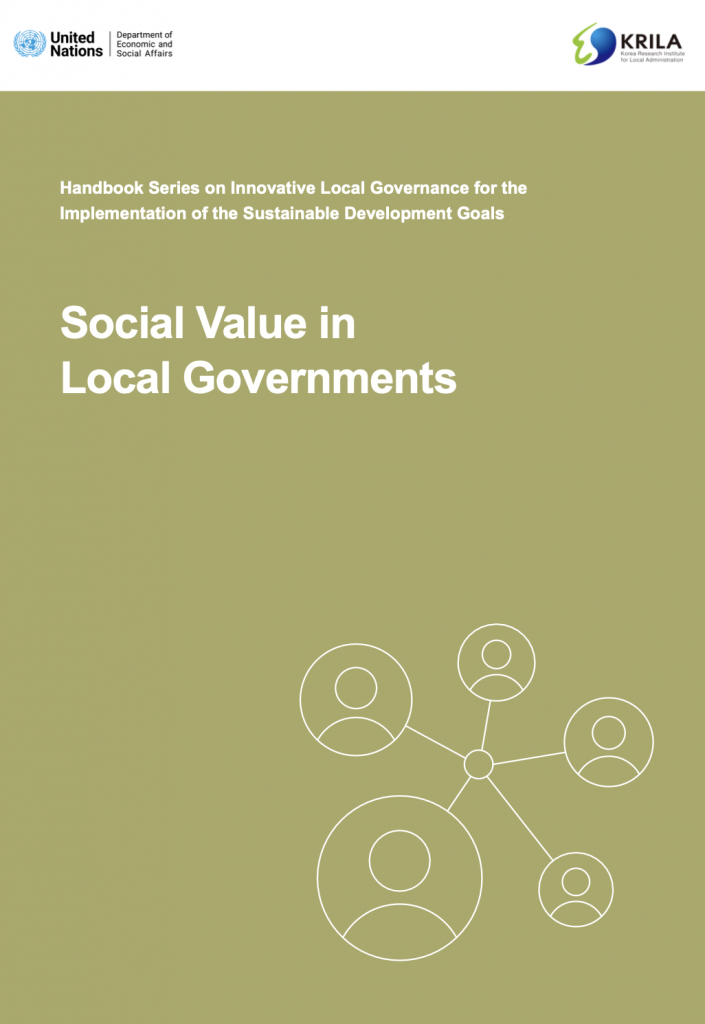This handbook furthers the discussion on the premise that social value is the main axis of the paradigm shift of local governments oriented towards traditional development administration. The handbook focuses on what should be done by local governments to spread social value, directly accommodating the demands of residents. The handbook presents the actions local governments must take to promote social values as five means, based on a new government framework. In the constitutional area, legislation of social value and establishment of social value exchanges are the means suggested. In the area of jurisdictional and civic infrastructure, the means include cooperative governance and a shared platform. In policy strategy and policy infrastructure and implementation and service delivery, means for quantification of social value (or establishment of an evaluation system) is introduced. The handbook also presents relevant cases for each means. Action steps and exercises needed and factors to be considered in implementing social value also are included. For in-depth consideration, refer to the cases.
This handbook is one in a series on Innovative Local Governance for the Implementation of the Sustainable Development Goals developed by the United Nations Project Office on Governance (UNPOG) of the Division for Public Institutions and Digital Government (DPIDG) of the United Nations Department of Economic and Social Affairs (UN DESA), in collaboration with the Korea Research Institute for Local Administration (KRILA). The series includes six handbooks that aim to support local authorities and other stakeholders in developing the necessary knowledge, skills and capacities to implement the SDGs by introducing strategies, approaches and tools and by showcasing innovative country cases and experiences. The private sector and civil society currently are active in efforts related to social values. This handbook introduces local government’s efforts to spread social values. While there have been some efforts in the public sector domain to carry out administration based on social values, confusion still exists in the field about what social values are and how to apply them to government administration. The purpose of this handbook is to provide concise guidelines to help resolve that confusion.
This handbook will address the following topics:
- The role of local government to promote social values will be discussed.
- The newest concept of social values will be examined, including how it differs from the existing concept.
- The handbook will explain what governments, especially local governments, should do to promote social values
Chapter 1: Social Value Legislation
This chapter introduces the need to legislate social values and various forms of legislation to do so. Examples are provided from countries that have legislated social values, and issues are presented that should be considered when implementing the legislative process.
Chapter 2: Establishment of Social Value Exchange
This chapter explores the concept and necessity of social value exchange. The case of the UK social value exchange is presented and several actions are suggested to consider when operating a social value exchange.
Chapter 3: Collaborative Governance to Realize Social Values
This chapter presents cooperative governance for realization of social values. Cooperative governance between members of society is needed for social values to have a practical effect for solving problems in a local community. Success factors for collaborative governance are presented.
Chapter 4: Quantification of Social Value
This chapter explains how to measure social value and how organizations can use social innovation to maximize social value. Examples of actual social value measurement indicators are presented so that they can be referenced in the development of indicators.
Chapter 5: Value Driven Public Servants
This chapter explains the concept and necessity of value-driven public servants. It also presents cases of institutional improvement measures to increase the number of such public officials.
Through the discussion above, the efforts that local governments should make to promote social value is examined in the frame of ‘the role of the government in creating new values.’ Several cases are presented so that readers can understand the meaning of the five measures based on this frame, and actions/steps and exercises are also provided for practical application. Some may say it seems premature to discuss government’s role in social value when discussions on what kind of social values each community should aim for are ongoing. While the kinds of social values may vary, the cooperation between governments and societies is essential to promote them. Therefore, discussing the role of the government, especially the role of local governments, which is closely related to local residents in the transition to a social value-oriented society, is appropriate.





